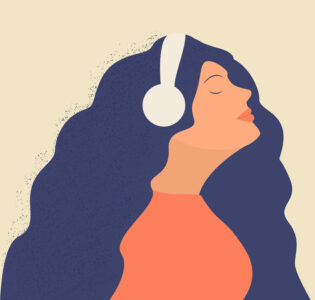Students need rest to do their best!
Clare Panetta, Psychologist, Genazzano FCJ College
Sleep is critical for optimal physical and mental health, and learning; yet many teenagers are chronically sleep deprived. To enhance student wellbeing, Genazzano FCJ College provides sleep education for students and specialised support for those experiencing sleep difficulties.
Teenagers should be sleeping just over nine hours a night, according to sleep experts. However, extensive research conducted by the National Sleep Foundation in America has revealed that, on average, teenagers are sleeping seven and a half hours on school nights. Similarly, an Australian study of senior secondary students reported that Victorian students are sleeping less than eight hours on school nights. Thus, many teenagers are not fulfilling their sleep quota and are chronically sleep deprived. Sleep is a necessity; like an absence of food and water, an absence of sleep ultimately leads to death. During sleep, growth and healing occurs more rapidly than when awake, memories and learning are consolidated and energy supplies are restored. The need for adequate sleep is paramount during the adolescent years, when the brain and the body are developing at a rapid rate.
Chronic sleep deprivation places young people at risk of adverse outcomes such as emotional dysregulation, mood disorders, poorer coping, greater stress, lower academic achievement, obesity, reduced reaction time and lower energy levels. Young drivers are also at high risk of fatigue-related accidents. The numerous effects of sleep deprivation on teenagers are well documented in the sleep literature, yet these findings are often not readily passed on to the very people that need this awareness the most: teenagers.
Some young people are chronically sleep deprived because they experience insomnia. A 2008 study of 3134 adolescents revealed that insomnia in adolescents is chronic and common, with more than 25% of the sample experiencing one or more symptoms of insomnia, and almost half of these teenagers having a chronic condition. Of critical importance is the link between sleep difficulties and mental health disorders such as depression and attention deficit hyperactivity disorder.
9 benefits of sleeping 9 hours every night:
- Improved brain function
- Better concentration
- Consolidation of fresh memories
- Reduced stress
- Strengthened immune system
- Better mood
- Improved physical performance
- Reduced likelihood of obesity
- More energy
Both internal and external forces compel teenagers to delay sleep. Biological sleep patterns shift towards later sleep times during puberty, meaning that teenagers are often not tired before 11pm. Psychosocial factors such as social networking, the Internet, television and schoolwork also keep teenagers out of bed. Thus, when it is time to rise for school, teenagers have often not achieved sufficient sleep and this pattern of late to bed and early to rise creates a sleep debt that teenagers try to pay off by sleeping in on weekends. Unfortunately, a large change in sleep-wake patterns between week nights and weekends confuses the body’s biological clock and affect the quality of sleep. Given the challenges teenagers experience in achieving adequate sleep, it is vital that they are educated about the biology of sleep, the consequences of insufficient sleep and how to maintain good sleep hygiene. Most schools educate students about exercise, nutrition and drugs and alcohol. Genazzano FCJ College goes one step further by also providing sleep education. For example, Year 7 students will watch a documentary designed for an adolescent audience that provides information about the importance of sleep and how to overcome sleep difficulties. They will then be provided information and discuss in groups ways to improve their sleep hygiene.Why isn’t switching off your mind as easy as switching off the light? Strategies to assist:
Go to bed and wake up at the same time every day.Exercise during the day. Restrict caffeine intake, especially in the afternoon/evening.Deal with problems during the day so they don’t haunt you during the night. Engage in relaxing activities before bed. If you have worrying thoughts, write them down in a notebook next to your bed and make a commitment to deal with them the next day. Relax by deep breathing or meditating. You cannot be relaxed and tense at the same time! Seek professional support. Insomnia is treatable!
Students who require more tailored or individual support are able to access the College’s psychology services. The College Psychologists are skilled in assisting students overcome insomnia and improve sleep hygiene. Parents are also often very keen to hear how they can support their adolescents towards better sleep. If young people are lying in bed finding it hard to sleep and then getting anxious that they are not sleeping, this can lead to a negative cycle that maintains wakefulness. Thus, a powerful strategy is to focus on relaxing in bed (rather than on trying to fall asleep- we cannot will ourselves to sleep), as a relaxed mind and body is what is needed for sleep to follow on naturally.
Having a consistent sleep and wake time, a “tech-free” zone before and in bed and dealing with problems during the day so they don’t haunt you at night are also tried and tested strategies for improving sleep. A shared understanding between teachers, students and parents that students need rest to do their best shines a spotlight on sleep, an otherwise dormant topic.
References
Roberts, R.E., & Duong, H.T. (2008). Chronic insomnia and its negative consequences for health and functioning of adolescents: a 12-month prospective study. Journal of Adolescent Health, 42(3), 294-302. National Sleep Foundation. (2008). Sleep in America Poll. Washington, DC: National Sleep Foundation; 2006. Retrieved on July 23rd 2010 at http://www.sleepfoundation.org/article/sleep-america-polls/2006-teens-an…. S., Murray, G., & Meyer, D. (2008). Holiday and School-Term Sleep Patterns of Australian Adolescents. Journal of Adolescence, 31(5), 595-608.
Website




